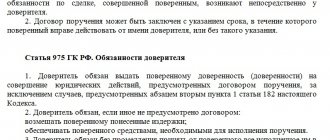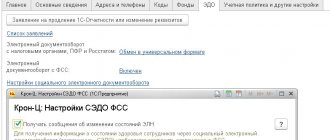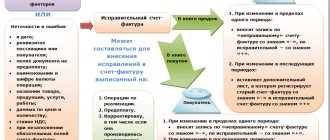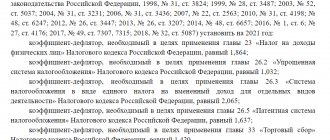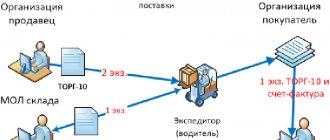What is an “irrevocable power of attorney”
An irrevocable power of attorney is a document issued by a principal to a trustee (attorney) to secure obligations related to the conduct of business. The peculiarity of such a power of attorney is that the principal cannot cancel it before the expiration of its validity period, or can cancel it only in cases provided for in the power of attorney itself.
An irrevocable power of attorney (an example of filling out a document can be found below) can be issued to any person whom the principal deems competent to do so. Legal entities and entrepreneurs can issue a document in order to ensure or fulfill specific obligations related to business activities. Current legislation does not establish restrictions on the validity period of the document. But since it is difficult to cancel it, the principal should be very responsible when determining the terms.
An irrevocable power of attorney was first introduced in civil law in 2013. This was done in order to regulate the actions of persons who may represent other subjects of legal relations in civil transactions on the basis of a concluded power of attorney.
Description
What is such a document? An irrevocable power of attorney is a formal agreement that cannot be terminated until it expires.
This document has one key feature, which is that it cannot be applied in different areas of activity. In other words, she has a purely target direction. The civil legislation of our country provides for two fundamental models within the framework of fulfilling such an obligation:
- The first model involves two participants in legal relations - the represented and the representative.
- The second extends its obligations to a third party and the represented entity, on behalf of which the representative acts.
In any case, an irrevocable power of attorney is an official document. Such an agreement must be certified strictly by a notary.
Where is an irrevocable power of attorney used?
An irrevocable power of attorney from an individual or organization has a targeted direction, that is, it cannot extend its effect to all relationships and areas of activity. The document can be issued only if the obligation is related to the conduct of business. Within the normal, non-entrepreneurial sphere, citizens will not be able to issue this power of attorney. The status of the represented persons and information about their state registration is indicated in the text of the document.
Entrepreneurs must be responsible when issuing an irrevocable power of attorney, as this process can entail significant legal risks. The trustee will be able to perform legally significant actions on behalf of the principal, and in some cases this may occur against the will of the principal.
Terms of use
As part of the method of ensuring the fulfillment of legal obligations, an irrevocable power of attorney can be used exclusively for business relationships. True, it can also be applied in conditions that are associated with the implementation of entrepreneurial activities, for example, within the context of the management of joint-stock companies.
Examples of an irrevocable power of attorney:
- The seller may issue a document to the buyer or his representative that will grant the right to remove the goods being sold from the warehouse.
- The use of this tool will help to avoid defending in court the right not to charge VAT on the deposit amount, while ensuring that the tenant fulfills his obligations to conclude a lease agreement.
Do not be mistaken that such a document can only be issued directly by the person engaged in business. In real life, not all participants in a joint stock company are entrepreneurs, but they have the right to issue a power of attorney.
What the current legislation says
An irrevocable power of attorney in civil law is regulated by Art. 188.1 of the Civil Code of the Russian Federation. This article provides the following:
- Legal entities and individual entrepreneurs will be able to become participants in legal relations.
- An irrevocable power of attorney is terminated upon expiration of its validity period or in cases provided for in the document itself.
- An irrevocable power of attorney must be notarized, otherwise it will be considered invalid.
- When drawing up a power of attorney, it should be indicated in its text that it cannot be canceled before the expiration of its validity period, or cancellation is possible only in the cases specified in the document.
- Submission of an irrevocable power of attorney is unacceptable. But if such conditions are recorded in the text of the document, the authorized person has the right to delegate an irrevocable power of attorney.
Terms of issue
Such a document can be issued to absolutely any representative whom the principal deems competent for this purpose. According to the article of the Civil Code, the powers vested in an individual on the basis of this document cannot be transferred to another person unless this is provided for by the terms of the agreement. Thus, an irrevocable power of attorney is a special document issued to a specific person without the possibility of transferring powers.
Is it possible to revoke an irrevocable power of attorney?
Cancellation of an irrevocable power of attorney is possible only if there are compelling reasons. Even in court it can be extremely difficult to get it overturned.
The main reasons for terminating the validity of the document are given below:
- expiration of the period specified in the power of attorney;
- abuse of the powers granted to him by a trustee to the detriment of the principal;
- termination of obligations that necessitated the issuance of a power of attorney;
- other reasons specified by the principal in the text of the document.
Unfortunately, the irrevocable power of attorney described in the Civil Code of the Russian Federation has certain problems of legal regulation, as a result of which it does not perform its functions effectively enough. To a greater extent, this is due to significant risks for the person whose interests are represented. It is recommended to use an irrevocable power of attorney only for one-time actions or for transactions whose terms are determined in advance.
Error when paying taxes for another person
The Federal Tax Service requires that you can pay tax for another person only with a power of attorney, because To pay tax, a representative must have a power of attorney. In accordance with paragraph 1 of Art. 45 of the Tax Code of the Russian Federation, the taxpayer is obliged to independently fulfill the obligations of paying taxes, but his interests can be represented by an authorized person, which is indicated in the payment slip. Also, the authority of the representative must be confirmed with documents, i.e. a notarized power of attorney and other powers of attorney equivalent to them.
Under this current legislation, documents are not checked at the bank and it is not possible to verify the authority of a representative when making a payment through an online bank.
Features of drawing up a power of attorney
An irrevocable power of attorney does not have a form established by law. But in order for the document to gain legal force, it must indicate the following:
- name of the document and purpose of its issuance;
- date of issue (from this date the power of attorney comes into force);
- information about the principal and attorney;
- a list of actions that the authorized person has the right to carry out;
- a list of situations in the event of which the power of attorney may be revoked;
- validity period of the document;
- signatures of the attorney and principal;
- notary's certification.
Why is it necessary to notify the representative and third parties about the revocation of the power of attorney?
By virtue of paragraph 1 of Art. 189 of the Civil Code of the Russian Federation, the person who issued the power of attorney and subsequently canceled it must notify both the representative and the third parties for whose representation the document was issued. The authorized person, upon learning that his powers have been revoked, must return the original document issued to him (clause 3 of Article 189 of the Civil Code of the Russian Federation).
If the representative has not been notified, he will be able to continue to perform the actions prescribed in the power of attorney on a legal basis, with all the ensuing consequences. If the representative was notified, but continued to use the canceled power of attorney and did not return it, his actions will be considered illegitimate.
In the case where only the representative, but not third parties, are notified of the revocation of the power of attorney, they will reasonably consider the powers of the representative to be valid, and accordingly, all his actions will be recognized as performed in the interests of the represented one (Clause 2 of Article 189 of the Civil Code of the Russian Federation).
Notification of document revocation can be done in several ways:
- Automatically, after the cancellation of any power of attorney through a notary, the next day after information about this is published in the register of notarial actions.
- By sending (or transferring) to the attorney and third parties a written document containing information about the revocation of the power of attorney - from the moment of receipt of the notification.
- After a month has passed after the publication of information in the Kommersant newspaper (the signature on the publication is required to be notarized, so you will have to visit a notary in this case as well).
Through the arbitration court
Through the arbitration court, the power of attorney is revoked according to the standard procedure, which is regulated by Federal Law No. 332. It turns out that you first need to inform the attorney that the power of attorney is being revoked, and only after that send an application to the court to revoke it.
When an application is made to the court, the registration procedure is standard. Therefore, an application to the court must be addressed to a specific court that is considering the case, describing the essence and reason for the revocation of the power of attorney.
Note! You must also attach the necessary documents to your application. For example, a copy of a letter addressed to the attorney and a duplicate of the power of attorney.
You can revoke a power of attorney through an arbitration court
Useful video
Watch a video on the topic:
To avoid abuse, an ordinary or general power of attorney must be revoked in a timely manner. How to properly issue a notification - read on our website.
Who can arrange it?
Some citizens of the Russian Federation have already appreciated the opportunities that this type of document can offer. It is gradually gaining popularity, this is not surprising. After all, it is a simple way to ensure and monitor the fulfillment of obligations.
Not everyone can issue an irrevocable power of attorney. Its issuance is possible only when carrying out business activities.
Note! Ordinary citizens cannot use this document. But entrepreneurs actively take advantage of the opportunities that this type of power of attorney offers them.


